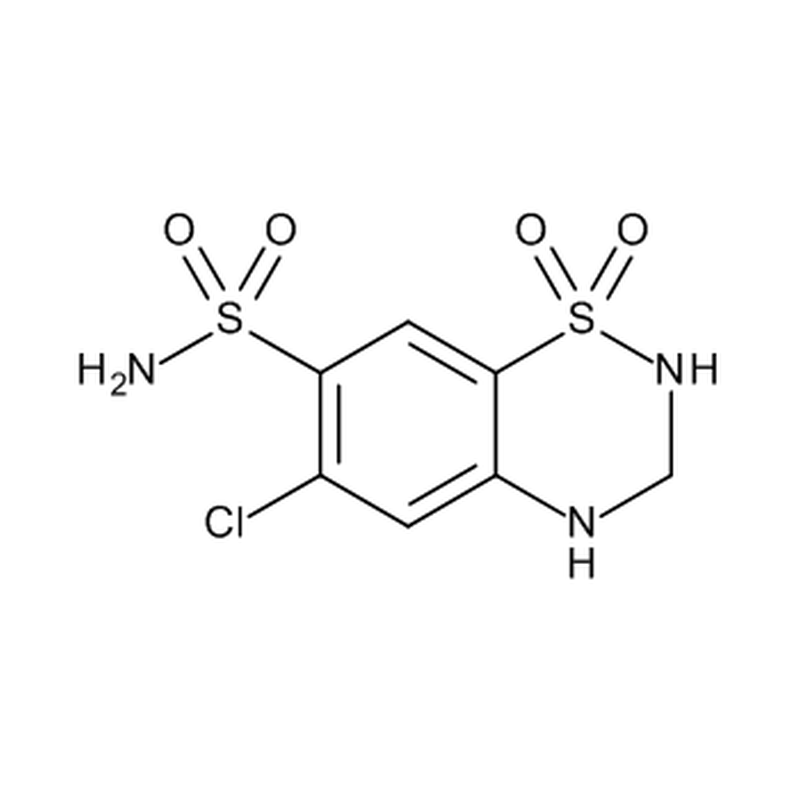产品
编 号:F398619
分子式:C7H8ClN3O4S2
分子量:297.74
分子式:C7H8ClN3O4S2
分子量:297.74
产品类型
规格
价格
是否有货
500mg
询价
询价
5g
询价
询价
10g
询价
询价
结构图

CAS No: 58-93-5
产品详情
生物活性:
Hydrochlorothiazide (HCTZ), an orally active diuretic agent of the thiazide class, inhibits transforming TGF-β/Smad signaling pathway. Hydrochlorothiazide has direct vascular relaxant effects via opening of the calcium-activated potassium (KCA) channel. Hydrochlorothiazide improves cardiac function, reduces fibrosis and has antihypertensive effect.
体内研究:
Hydrochlorothiazide (HCTZ; orally bygavage; 12.5 mg/kg/d; 8 weeks) has improved cardiac function, reduced cardiac interstitial fibrosis and collagen volume fraction, decreased expression of AT1, TGF-β and Smad2 in the cardiac tissues in adult male Sprague Dawley rats. In addition, hydrochlorothiazide reduces plasma angiotensin II and aldosterone levels. Furthermore, hydrochlorothiazide inhibits angiotensin II-induced TGF-β1 and Smad2 protein expression in the neonatal rat ventricular fibroblasts.
体外研究:
Hydrochlorothiazide belongs to thiazide class of diuretics. It reduces blood volume by acting on the kidneys to reduce sodium (Na) reabsorption in the distal convoluted tubule. The major site of action in the nephron appears on an electroneutral Na+-Clco-transporter by competing for the chloride site on the transporter. By impairing Na transport in the distal convoluted tubule, hydrochlorothiazide induces a natriuresis and concomitant water loss. Thiazides increase the reabsorption of calcium in this segment in a manner unrelated to sodium transport. Additionally, by other mechanisms, Hydrochlorothiazide is believed to lower peripheral vascular resistance.
Hydrochlorothiazide (HCTZ), an orally active diuretic agent of the thiazide class, inhibits transforming TGF-β/Smad signaling pathway. Hydrochlorothiazide has direct vascular relaxant effects via opening of the calcium-activated potassium (KCA) channel. Hydrochlorothiazide improves cardiac function, reduces fibrosis and has antihypertensive effect.
体内研究:
Hydrochlorothiazide (HCTZ; orally bygavage; 12.5 mg/kg/d; 8 weeks) has improved cardiac function, reduced cardiac interstitial fibrosis and collagen volume fraction, decreased expression of AT1, TGF-β and Smad2 in the cardiac tissues in adult male Sprague Dawley rats. In addition, hydrochlorothiazide reduces plasma angiotensin II and aldosterone levels. Furthermore, hydrochlorothiazide inhibits angiotensin II-induced TGF-β1 and Smad2 protein expression in the neonatal rat ventricular fibroblasts.
体外研究:
Hydrochlorothiazide belongs to thiazide class of diuretics. It reduces blood volume by acting on the kidneys to reduce sodium (Na) reabsorption in the distal convoluted tubule. The major site of action in the nephron appears on an electroneutral Na+-Clco-transporter by competing for the chloride site on the transporter. By impairing Na transport in the distal convoluted tubule, hydrochlorothiazide induces a natriuresis and concomitant water loss. Thiazides increase the reabsorption of calcium in this segment in a manner unrelated to sodium transport. Additionally, by other mechanisms, Hydrochlorothiazide is believed to lower peripheral vascular resistance.
产品资料

